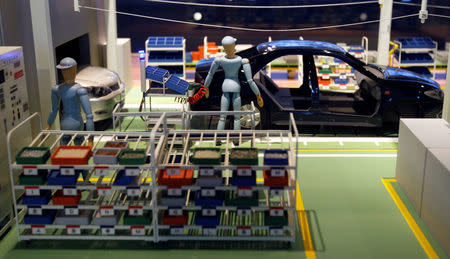Japan Inc signals boost to domestic capex but less keen on the U.S.: Reuters poll
By Tetsushi Kajimoto TOKYO (Reuters) - One third of Japanese firms are looking to lift business investment at home in the next financial year, but companies are less bullish about capital spending in the United States due to uncertainty over the Trump administration's policies, a Reuters poll showed. Japanese auto firms, however, were responsive to President Donald Trump's campaign to put 'America First' with nearly a third looking to boost local procurement and others planning to raise factory utilization rates. The Reuters Corporate Survey found 33 percent of companies expect to boost domestic capital spending while 57 percent aim to maintain the previous year's levels - a hopeful sign for Prime Minister Shinzo Abe's efforts to engineer a sustainable economic recovery. It is the first broad poll to gauge Japan Inc's business investment plans for the year beginning in April. Japanese firms tend to be very cautious in their initial capital spending forecasts and revise up as the year progresses. "This is a positive sign," said Hidenobu Tokuda, senior economist at Mizuho Research Institute, who reviewed the survey results. "Japanese manufacturers have taken a wait-and-see approach about capital expenditure due to slack overseas demand but they are easing this stance," he said. Any overall rise in domestic capital spending would follow a 5.5 percent increase projected for big firms during the current fiscal year which comes after a 3.4 percent increase in the previous year, according to central bank data. In contrast to plans for Japan, only nine percent of firms which took part in the Jan. 31-Feb. 14 survey currently want to boost capital spending in the United States while 79 percent saw it flat. The nine percent was also far less than the 21 percent which aim to boost capital expenditure overseas in countries other than in the U.S. The monthly survey, conducted for Reuters by Nikkei Research, polled 531 big and mid-size firms and between 190 and 240 firms answered questions on capital spending. Around 13-14 auto firms, including carmakers and their suppliers, responded to questions about their U.S. business plans. Just over half of Japanese firms said they believe U.S. demand will expand over the next year or two with many respondents saying they believed Trump's policies would create jobs and spur consumer spending. Twenty-seven percent see demand flat while the rest predicted a contraction. But when asked if there had been any change in stance towards their U.S.-related businesses given Trump's statements and actions since becoming president, 85 percent said there had been none. "We don't know yet what the U.S. is going to do," wrote a manager at chemicals company, an answer echoed by many other respondents who said they were taking a wait-and-see stance. Japanese companies are weighing both negative factors such as border tax and higher tariffs as well as positive factors such as deregulation and tax cuts, all of which remain unclear, said Tokuda at Mizuho Research. Japanese auto firms were more cautious about the outlook for U.S. demand than other sectors. After record sales of more than 17.5 million vehicles in 2016, many auto executives believe the market is peaking although some consultancies are now calling for a new record to be set this year due to Trump's policies. But the Japanese auto industry was the most responsive sector to Trump's 'America First' campaign with nearly a third of the 13 auto firms responding looking to boost local procurement and a fifth saying they planned to lift factory utilization. Automakers in particular have come under fire from Trump for not creating sufficient U.S. jobs. That compares with just 4 percent of Japanese firms overall planning to boost U.S. procurement and 3 percent planning to increase capacity utilization. For a Graphic on Japan firms signal boost for domestic capital spending, click: http://fingfx.thomsonreuters.com/gfx/rngs/JAPAN-COMPANY/010031Y04E7/JAPAN-SURVEY.jpg (Reporting by Tetsushi Kajimoto and Izumi Nakagawa; Additional reporting by Naomi Tajitsu; Editing by Edwina Gibbs)

 Yahoo Finance
Yahoo Finance 

